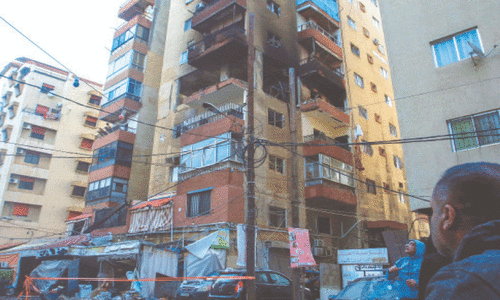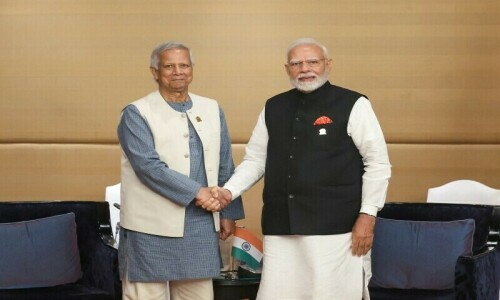One feels appreciative of Farhad Humayun’s candid thoughts on music. He can be blunt with words, but his version is always pragmatic. Images on Sunday caught up with him during Overload’s Miami tour, and the conversation turned towards the status of the music industry in these times.
A few weeks ago, videos of infectious Pakistani rhythms playing at a party in South Beach, with locals dancing around a campfire and under a full moon appeared on the internet. Overload surprised the state of Florida at various public venues, including the famous Wynwood Art District, with Farhad Humayun on the snare drum and the band’s signature whirling dhol players. The band also rocked the cricket stadium in Ft. Lauderdale at a Pakistan day event, and became a hit in the Southern region of the US.
This was the first time Overload toured the US, playing a rigorous routine night after night at the week-long SXSW Festival in Austin, Texas, where their music received acclaim from American audiences as well as critics. “It’s really reassuring when a band like ours receives such a warm welcome, and is regarded as a world-class act. Bands and artists in Pakistan need to get out into the world and tell others what our lives are like here, where remarkable young people are expressing themselves through music and the arts.
“The more people we reach, the more awareness we create about who we are because a government or the clergy never represent the true face of a country but always the people, and we have so many young voices that need to be heard. By doing what we do, we are promoting an image for the place we belong to. Art/music is an individual expression, and an artist is free to say or do what he wants to through his form.”
No artist can have a following without a public space where people can engage with him
Farhad says social media is the only tool available to a musician to reach out to people, whether in Pakistan or internationally. “TV channels and radio stations don’t play Pakistani music anymore. In fact, TV channels ask to be paid to run music whereas it should be the other way round. I also feel bands need to produce better-sounding music produced professionally, and videos that are visually appealing to create more impact. But no matter what we do, there is no substitute for live music.”
People love actors because there is a public space for films — cinemas and cineplexes — adds Farhad. “We can buy a ticket and go watch a film starring Fawad Khan, and that’s great. No artist can have a following without a public space where people can engage with him. Likewise, concerts, if done right, can be life-altering experiences.”
Corporate sponsorship pays for music and is the only way musicians can survive as there are no venues in Pakistan where bands can go and play and be paid. “There are no record companies which pay bands to record albums or share royalties with them. Nobody buys concert tickets and there are no concerts happening for the public anymore. People don’t even buy their favourite artist’s albums because they’ve been programmed to consume things for free. What they don’t realise is that one day there will be no music because the artists will have run out of money to produce music!”
Farhad says he uses his own endorsements to fund his music. “If I create a jingle for a brand, I make sure I am paid enough to finance my music and video productions, and be left with enough to sustain myself. Our artists need to do more than just play music as there is no system in place to handle the business aspect. I’m not against corporate sponsorship, but sometimes they can make demands that make an artist like me uneasy or feel like they own me because they’re paying me. But one can always decline the offer. The trick is to keep making music and writing songs no matter what. It’s better to do singles in a place where people don’t pay for music. If you’re a new band, I recommend doing at least two or three albums before singles. I have two albums and 11 singles, so I have lots of material I can play live.”
Farhad says it takes about a year to compose, write, record, mix and master an album, and then promote it. And it takes a lot of moolah to do that. “Nobody has that kind of money to spare and no corporation will fund an album. Both corporations and the public want immediate response, so by the time an album is finished; the artist is forgotten because he’s been invisible from the public eye for so long.”
Overload will continue to play live, says Farhad. “I’m the only member who is composing, writing, recording, mixing, making videos and funding the band. The other players are session artists who come in when we are recording their parts or touring. At this time in my career, I want to play other kinds of music, so I’ll be releasing some brand new solo stuff. You can expect my solo music to be autobiographical and brutally honest.”
Published in Dawn, Sunday Magazine May 15th, 2016















































